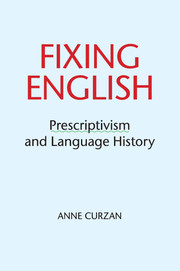Book contents
- Frontmatter
- Dedication
- Contents
- List of figures
- Acknowledgements
- Introduction: does prescriptivism fail?
- 1 Prescriptivism’s umbrella: standards, style, restoration, and political intervention
- 2 Prescriptivism’s lessons: scope and “the history of English”
- 3 Checking grammar and grammar checkers
- 4 Dictionaries and the idea of “real words”
- 5 Nonsexist language reform and its effects
- 6 Reappropriation and challenges to institutionalized prescriptivism
- 7 Finding shared ground: public conversations about prescriptivism
- References
- Index
- References
4 - Dictionaries and the idea of “real words”
Published online by Cambridge University Press: 05 July 2014
- Frontmatter
- Dedication
- Contents
- List of figures
- Acknowledgements
- Introduction: does prescriptivism fail?
- 1 Prescriptivism’s umbrella: standards, style, restoration, and political intervention
- 2 Prescriptivism’s lessons: scope and “the history of English”
- 3 Checking grammar and grammar checkers
- 4 Dictionaries and the idea of “real words”
- 5 Nonsexist language reform and its effects
- 6 Reappropriation and challenges to institutionalized prescriptivism
- 7 Finding shared ground: public conversations about prescriptivism
- References
- Index
- References
Summary
The second edition of the New Oxford American Dictionary, published in 2005, featured a made-up word that began with the letter e-. Henry Alford, a contributing writer for the New Yorker, took the leak of this information as a challenge to sort through the 3,128 e- entries in the dictionary, consult with six lexicographers, and determine the culprit. The playful made-up word, confirmed by editor-in-chief of the second edition Erin McKean, was esquivalence, defined as ‘the willful avoidance of one’s official responsibilities’. The word was included in the dictionary in order to catch any rogue editors at competing dictionaries who might be plagiarizing from the New Oxford American Dictionary.
This sleuthy (to make up a word of my own) enterprise was deemed worthy of two and a half columns of text in the “Talk of the Town” section of the New Yorker (Alford 2005). I note that fact not as a critique: it was a wonderfully entertaining piece, and, as a linguist, I am always happy to see lexicography (the work of “harmless drudges,” to quote Samuel Johnson’s definition of the word lexicographer) get a bit of the limelight. My interest in Alford’s piece, in the context of this book, is the discourse that makes this bit of news possible as news. For esquivalence to be noteworthy, the dictionary’s readers must have accepted the idea that there are “real” words and “not real” words and that dictionaries are the arbiters that decide on which side of “real” a word falls. The notion of “real words” can be so commonsense to Modern English speakers and writers that it may seem odd to question the validity of this concept. But for the real-word discourse to be meaningful, there have to be accepted arbiters on the status of words. Dictionaries have come to be such arbiters, although they certainly did not always function this way.
- Type
- Chapter
- Information
- Fixing EnglishPrescriptivism and Language History, pp. 93 - 113Publisher: Cambridge University PressPrint publication year: 2014



